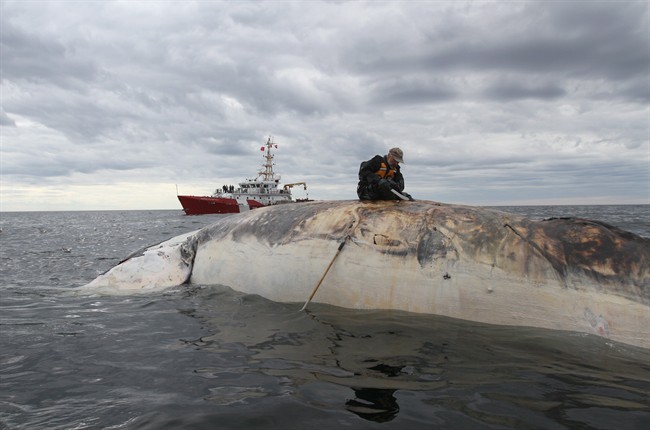MONCTON, N.B. – A marine mammal expert says the fate of a critically endangered species could hang in the balance with the death of six North Atlantic right whales found floating in the Gulf of St. Lawrence.

Tonya Wimmer of the Marine Animal Response Society says the string of deaths is “unprecedented,” amounting to more than one per cent of the 500 North Atlantic right whales believed to be roaming the seas.
“For a species that’s sort on the brink like this, every individual counts,” says Wimmer. “Every year we might have a few individuals that are found dead, and those are devastating in themselves … We’re at six (deaths) confirmed, and that’s quite catastrophic for this population.”
Wimmer say federal scientists, marine biologists, fishermen and other experts have rallied to get to the bottom of what killed the mammals. The Fisheries Department has sent aircraft and Canadian Coast Guard vessels try to track down the carcasses in the waters near the Magdalen Islands.
The Marine Animal Response Society joined an expedition to examine one of the dead whales last Thursday, Wimmer says. Collecting biological samples will be critical to determining what caused the deaths and hopefully prevent further losses, she says, but it will take a “small army” to fully dissect the carcass of one of the whales.
“There is a huge sense of urgency to get out there and try our best to figure out what’s going on,” Wimmer says. “Being able to get at the root cause is really important, but time is of the essence.”
- Train goes up in flames while rolling through London, Ont. Here’s what we know
- Wrong remains sent to ‘exhausted’ Canadian family after death on Cuba vacation
- Liberals having ‘very good’ budget talks with NDP, says Freeland
- Peel police chief met Sri Lankan officer a court says ‘participated’ in torture
Scientists have a short window of opportunity to examine the whales before their remains are lost to decay, the marine biologist says, their blubber broiling in the heat and turning the dead animal into “a giant oven.”
Marc LeCouffe of the Fisheries Department says officials are to meet Monday to discuss the next step in their response: hauling a massive mammal to shore for a post-mortem examination.
Some of the whales have been tagged with satellite trackers, which will make it easier to find the drifting carcasses, says LeCouffe.
“These are huge, huge beasts — maybe 50 feet (15 metres) long — so we need a vessel that’s big enough to be able to tow,” says LeCouffe. “A large strap is attached to the vessel and around the tail of the whale so we can pull it, and that can be done fast, obviously, because if you pull too fast in those waters, you could tear the whale up and then you wouldn’t have any tissues to do any sampling.”
On land, the scientists would take over and examine the whale, says LeCouffe, while his team staves off curious onlookers — then there’s the question of what to do with the remains.
“The big part is getting rid of that carcass and everything that goes with it,” LeCouffe says. “It’s big, so we’ll have to be able to find a place to dig a hole and bury it.”
North Atlantic right whales are amongst the most studied whales in the ocean, says Wimmer, with researchers developing drones, apps and other technologies to track their elusive migration patterns.
She says the species has only recently been spotted in the Gulf of St. Lawrence, raising questions about whether environmental factors could have played a role.
“If it’s something that we can control … we need to alter our behaviour so they don’t get harmed,” says Wimmer. “I would say it’s important not only for this critically endangered species, but all these other whale species we have in our waters.”
The North Atlantic right whale was hunted to near extinction in the late 18th century and has struggled ever since. They are particularly vulnerable to ship strikes because they are oblivious to their surroundings while eating.
—
By Adina Bresge in Halifax



Comments